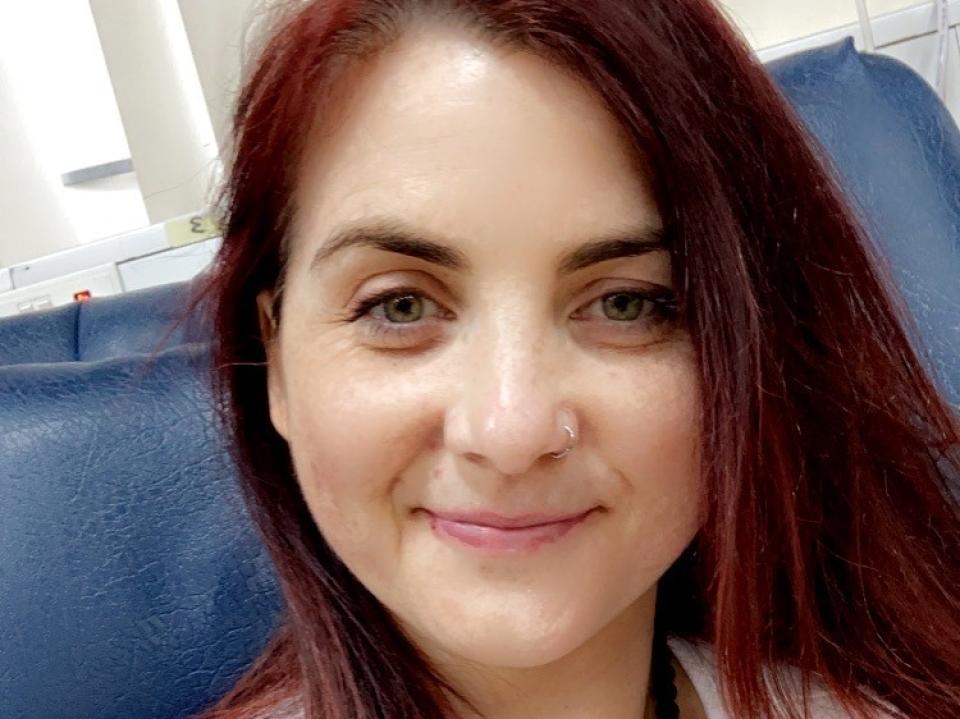
There can be a certain amount of hesitancy around discussing bowel movements and bowel health. Tess Greene, who was diagnosed with Stage 4 bowel cancer in December 2021, would like this to change.
Tess, who lives in Donegal, has a history of having constipation. When the constipation grew worse in October last year and she also started to experience pain and fatigue, she didn’t think it was anything to be concerned about initially. She had recently changed her method of contraception and attributed her cramps to this. “I was taking painkillers for the cramps and when the constipation got worse, I put it down to that because I normally never take painkillers,” she says. “I was also quite tired but I had just moved to Derry and started a job. My daughter had moved to college so I had empty nest syndrome really badly and I was in the final year of a psychotherapy degree as well. Altogether, I thought it was natural for me to be wrecked.” She didn’t visit her GP because, “constipation has become something we self-medicate for with all the over-the counter meds available and I thought it was too simple an issue to bother them with.”
Looking back, she says that she had noticed changes in her stools. “Because I was constipated, I thought that was happening because of that and because of the stress I was under.”
Tess’s pain grew worse and she eventually went to A & E. While waiting to be seen, she realised that she hadn’t been to the toilet in almost three weeks. “Even at that point, I never once thought it was cancer,” she says. “I was 38 and I’d always associated bowel cancer with older people.”
Following, an X-ray, ultrasound, CT scan and colonoscopy, Tess was told she had a tumour in her bowel. On December 22, she underwent an 11-hour surgery and in January, she received a diagnosis of Stage 4 bowel cancer which had spread to her lymph nodes and to the peritoneum, the layer of tissue lining the inside of the tummy. Tess is currently undergoing chemotherapy, which has made her very nauseous at times, and she is due to have between 12 and 18 treatments.
She would like there to be greater awareness of the symptoms of bowel cancer.
“I was too dismissive of signs that weren’t normal,” she says. “It’s really about being in tune with your body and getting to know what’s normal for you. Rather than being something that’s laughed off or something that isn’t talked about, it’s really important to be aware of bowel health and pay attention to any abnormal symptoms.”
Something that has helped her is documenting her cancer journey on social media.
“I write and I’m a journaler but I found journaling quite difficult since this all happened. I felt there was too much going on in my head to write it all down but on social media, I’m talking and everything is coming out,” she says. “When people say I’m brave or I’m being an inspiration, I feel awkward because I don’t feel that way. Instead I see the social media outlet as a medium for me to have fun, be myself and get out what's in my head; I am just grateful that there are people who want to hear that.”
Her diagnosis has changed her outlook in ways.
“My cancer diagnosis has made me feel more gratitude for simple, everyday things in our life than I ever thought possible. It has changed my perception on what is actually important forever — family, friends, connection and experiences. It’s given me choices on how I look at my circumstances. Adopting a positive, progressive perspective needs a bit more work having than a negative one but I think it pays off in the end. My goal now is to recover enough so that I can practise this learning and appreciate wholly what life can be.”
Her family, especially her daughter Millie, have been a constant support during this time.
“Millie has been so incredible throughout all of this and has continued to show such strength every day. She was with me the time I went to A&E and to be honest she makes up a large part of the reason why I want to continue to do all I can to get my life back again.”
Contact the Irish Cancer Society Support Line
If you have worries or concerns about cancer, you can speak confidentially to an Irish Cancer Society Cancer Nurse through the Freephone Support Line on 1800 200 700.
Monday to Friday, 9.00am - 5.00pm
For more information
Phone
1800200700

